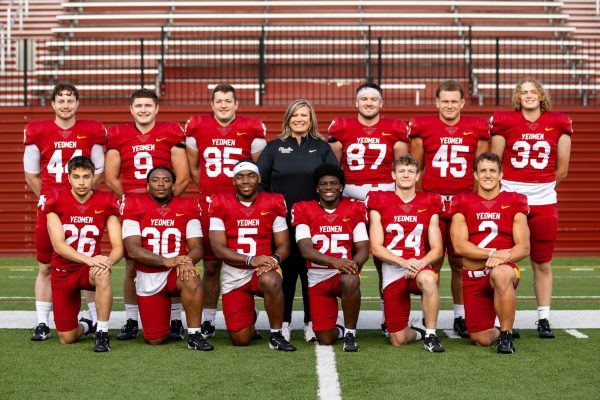Dave Zirin Provides Model for Sportswriters By Respecting Intelligence of Sports Fans
Dave Zirin, political sportswriter and editor for The Nation, spoke at my high school five or six years ago. Since his visit, I’ve found myself reflecting on his words from time to time, especially as I have grown older and begun to pursue sportswriting myself. It is only now, years after seeing him onstage in my high school auditorium, that I’ve come to understand why I found him so memorable.
For one thing, I’ll never forget how Zirin had the courage to visit a Chicago high school and explain to its student body why the Chicago Blackhawks are a prime example of racism in sports. He debunked a few myths, such as the idea that the Blackhawks were named after a native tribe when, in fact, they were named after a Sauk leader who was ultimately captured in war and degradingly paraded around the country. We were left with a jarring and undeniable truth that, yes, one of our favorite sports teams was no exception to racism.
I remember that he spoke about many issues that I had never discussed before, such as the controversy surrounding Cam Newton and the differences between the criticism directed at black and white quarterbacks. He discussed the nuance of racism and sexism in sports, and highlighted ways we could identify such themes. Up until that day, I had engaged in conversations with my peers and family about sports, as well as separately about race and gender, but never in tandem.
Even as a female athlete and sports fan of color in a predominately white school, I still hadn’t quite made the connection between sports and sociopolitical issues. This was partially due to the pressure to assimilate with my peers, as many people experience in high school. But it was also a result of me lacking the proper language to think critically or speak about race and gender in sports. I could extensively discuss game statistics and predictions for game outcomes — yet I could barely articulate my own experiences as an Asian- American athlete.
Zirin is still one of the most relevant and thoughtful sportswriters today, to which I am equal parts happy and disappointed. Happy, because his writing and social media presence continue to bridge the gap between sports and sociopolitical issues; disappointed, because the strong need for his voice shows that these issues are just as prevalent as they were when I first saw him speak.
On his Twitter account alone, Zirin recently highlighted connections between the NFL and activism to support undocumented immigrants; emphasized the importance of Ryan O’Callaghan’s underpublicized biography detailing his experiences as an openly gay NFL player; and continued to push the conversation around the economic disparity between the U.S. Women’s National Soccer team and their male counterparts. On top of all that, he has emerged as an outspoken critic of President Donald Trump.
Although Zirin isn’t the only sports journalist who addresses real-world issues, his voice stands out above others. He is paving the way for future sportswriters, based on one defining characteristic in his work: He acknowledges that sports fans are smart.
Dedicated fans are constantly consuming media related to sports. However, major programs like SportsCenter tend to avoid venturing beyond game clips, short recaps, or predictions.
Challenging this culture, Zirin appears to believe that sports fans are fundamentally intelligent, a belief not usually conveyed in mainstream media. He leans on this intelligence as a vehicle to foster a deeper understanding of issues beyond the realm of sports. He takes our attention and directs it toward politics and social justice.
In recent years, the Sports section at The Oberlin Review has decided to shape itself around the example of sportswriters like Dave Zirin. We have deserted the kind of pieces that don’t reflect the cultural complexity that exists in sports. It is our hope that sportswriting continues to change in such a way; it is a common misconception that sports fans don’t enjoy being challenged and thinking critically, when these are the exact characteristics that draw us to sports in the first place.






